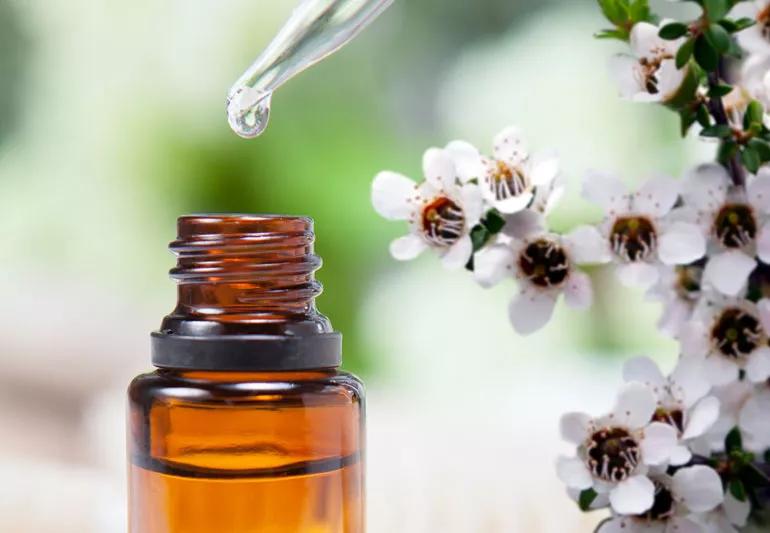It isn’t risk free and shouldn’t replace the aftercare recommended by your piercer

Image content: This image is available to view online.
View image online (https://assets.clevelandclinic.org/transform/ff7ee7ea-416a-489e-a44a-cc8092bda0e4/tea-Tree-Flowers-oil-164560100-770x533-1_jpg)
Close up of tea tree essential oil with tea tree blossoms in the foreground.
Tea tree oil (also known as melaleuca oil) is an essential oil that — in its diluted form — is used topically to treat a wide range of skin issues, from acne and athlete’s foot to dandruff and insect bites.
Advertisement
Cleveland Clinic is a non-profit academic medical center. Advertising on our site helps support our mission. We do not endorse non-Cleveland Clinic products or services. Policy
Tea tree oil is a great natural alternative to synthetic anti-inflammatories. And it has antiseptic properties to boot! But should you really be putting it on a fresh piercing? We asked family physician Simon Hodes, MB ChB.
Some turn to tea tree oil for wound care because of its natural antimicrobial and anti-inflammatory properties, but it can also dry out and irritate skin — especially if the tea tree oil isn’t properly diluted.
“Tea tree oil may well have a place in your piercing aftercare, but that’s a question of personal preference,” Dr. Hodes says. “I think it’s something I’d be very cautious about recommending medically because if you’ve got irritated or sensitive skin, you need to be very careful.”
Dr. Hodes is clear that you should always follow the aftercare instructions you get from your piercer. If you want to use tea tree oil, you should be doing so in addition to anything they recommend, not as a substitution for it.
While he doesn’t recommend it, Dr. Hodes notes that tea tree oil is generally safe to use on most piercings, with two big exceptions. First, tea tree oil is toxic when ingested, so you should avoid using it on any oral piercings. Second, genital piercings are particularly sensitive. They should only be treated as indicated by the piercer.
Advertisement
The way you prepare tea tree oil for piercing aftercare has a lot to do with how you plan on using it: As an added ingredient in your existing aftercare routine or another separate step. No matter how you’re using it, remember that tea tree oil always needs to be diluted before applying it to your skin.
If you’re looking for a quick way to cleanse your piercing between sea salt soaks, you can apply tea tree oil using a cotton round, cloth or paper towel. You can either:
Most piercers recommend twice daily sea salt soaks. If you’re not looking to add an extra step to your aftercare routine, you can add a drop or two of tea tree oil to your regular soak (be it a DIY or store-bought solution).
It’s important to keep the following in mind if considering tea tree oil for piercing aftercare:
Tea tree oil is a natural anti-inflammatory and has been found to have antiseptic properties. For that reason, some like to use diluted tea tree oil as part of their post-piercing aftercare.
While generally safe to use on most kinds of piercings (excluding piercings of the mouth and genitals), it’s important to exercise caution. Some people are allergic to tea tree oil, while others find it irritates their sensitive skin.
Whether or not to incorporate tea tree oil into your piercing aftercare routine is a good conversation to have with the person who gave you the piercing.
Advertisement

Sign up for our Health Essentials emails for expert guidance on nutrition, fitness, sleep, skin care and more.
Learn more about our editorial process.
Advertisement
Earlobe piercings heal quicker and are less painful than cartilage piercings — proper cleaning and care are important
Soap, water and an antibiotic ointment are your best bet
Understand the risks and take precautions against infection
Twice-a-day cleaning with a saltwater solution can help you resolve (and avoid) problems
A dermatologist explains why it happens and how to address it
You may be surprised to learn that acupuncture usually doesn’t feel like anything — and any discomfort is typically brief
Eczema triggers are different for everyone, but there are some common ways to manage flare-ups, like using a humidifier and fragrance-free creams
Over-the-counter antifungal creams usually get the job done, but it’s important to keep it from spreading in the meantime
Although it could be used as a moisturizer, this new trend is not recommended
Communicating clear limits helps protect your time, energy and emotional well-being
High cholesterol can be genetic, but testing and treatment can lower your heart disease risk